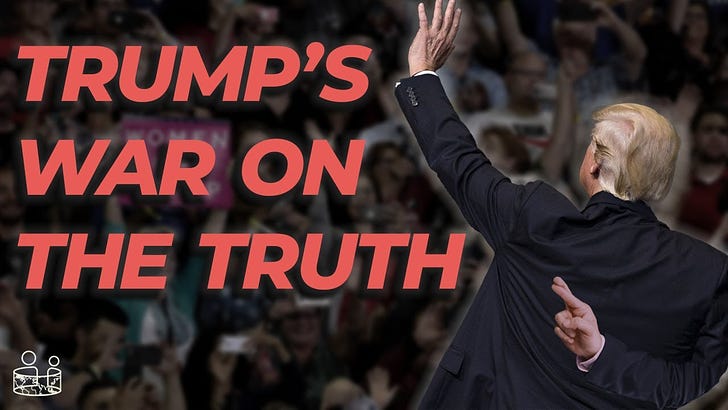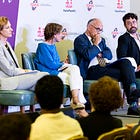Trump's Lies Are More Injurious than Mere Propaganda
He wants to shatter our shared objective reality and sow chaos
Dear Readers:
Despite his favorite social media platform’s name, Donald Trump has a tenuous relationship with the “Truth.” From his blatant efforts to discredit attempts to expose his transgressions as "fake news" to his outright fabrications about his opponents (such as his birther conspiracy theory against Barack Obama), the former president’s tactics have eroded public trust and undermined our sense of shared objective reality.
However, he is far from the first would-be authoritarian to weaponize postmodern conceptions of “truth” toward sinister ends. He may rely on rapidly evolving social media and other modern tools. But his motives are standard, old authoritarian fare, namely, sowing doubt and mistrust against opponents and institutions that try to hold him accountable. He is not merely peddling propaganda to burnish his image, although he is doing that. He wants to manipulate perceptions, create chaos, and consolidate power over a public that is no longer capable of distinguishing between truth and falsehood—reality and fakery.
My latest video tries to reveal the method behind Trump’s media madness so that we can better understand what he’s up to and guard against it. You can view it here or on our YouTube page (which you should also subscribe to!). And let us know in the comments: Which of Trump’s lies do you find most damaging to liberal democracy?
Landry Ayres
Senior Producer
Related Reading
:Back in 2016, those who warned about Trump’s fondness for authoritarianism—be it his dictator chic decor, his historic and ongoing admiration for strongmen, his appeals to white grievance, his desire to crush protests with military force, his delight at the prospect of inflicting violence on his critics and imprisoning his opponent, or his warning that, if needed, cops, soldiers, and groups like the Proud Boys would inflict violence on his enemies—were diagnosed with “Trump Derangement Syndrome.”
That continued up through the 2020 election, when those of us who warned that Trump may not leave office willingly were chastised for catastrophizing. If you feared that Trump might be reluctant to give up power, resort to violence, or try to delegitimize the electoral process by sowing conspiracy theories, you were ridiculed as a fearmonger, even as Trump preemptively declared that any election result that did not make him the winner would be illegitimate.
And not just Republicans. Plenty of self-declared moderates and centrists downplayed the threat to democracy, scolding anyone who dared suggest that Trump might not leave office willingly.
While the electoral event that was held from March 15-17 across Russia (and parts of Ukraine) had the trappings of a democratic contest, with voters choosing from among candidates of different parties, this was no real election. … Russia’s presidential elections are a public spectacle the Putin regime uses to project popular support. They are intended to grant his regime democratic legitimacy. … [W]riting in The Atlantic, global politics professor Brian Klaas recommends describing Russian presidential contests as “election-style events” rather than “elections” since they fall short of even being minimally democratic affairs. Since 2000, Putin’s first year as president, he has gradually come to attain totalitarian control over Russia. He has deliberately transformed what was a burgeoning democracy in the 1990s into a repressive dictatorship with major implications for global geo-politics. His ruling model has been authoritarian kleptocracy. …
For Putin … the domestic situation is key. He does not care about economic growth and social development as long as the Russian people stay passive. Values do not seem important to him, while power is. He appeals to the existing values of his chosen electorate as a seasoned politician and draws on arguments that justify his rule. For Putin, a bad war is better than a good peace, because the war allows him far more repression, and more repression allows him more power. At present, Putin appears to have arrived at the conclusion that he needs a permanent war to stay in power.
Every election since 2000, including the one Russia just held, is at bottom nothing more than a public spectacle designed to further consolidate Putin’s power over a nation whose actual sentiments we won’t know until after he is gone. In fact, Putin’s greatest-ever victory is that we may never know them at all.
If you look around the world, at moments when democracies collapse and dictatorships arise, it’s almost always at a moment of enormous strife and civil war—as with the rise of Napoleon after the French Revolution—when people feel not just economically insecure but physically insecure. And it's almost always a time when there's a cacophony of voices wanting different things, leading to people eventually saying, “Right, we want to end this conflict, and we want a single leader.” There's always a part of the population that prefers that. In almost every country on the planet, except those who have managed to control their internet, like China, you now have people living in that kind of world. All of us have access to a constant stream of information, often contradictory—there’s one view of the world available with one click on your phone, and then there's a completely different view available on another. The reality that people have before them is extremely complicated. There are no guideposts. We're rapidly losing faith in the institutions that used to help us sort out what's true and what's not true—whether it's universities, newspapers, authority figures. And how do people react in that kind of situation? They demand silence, they demand order, they demand safety. There's a reason this is happening in so many countries at the same time: it’s because people are faced with the same breakdown of narratives. Whether it’s the United States, the Philippines, Hungary, Brazil, you see this very similar phenomenon.
We're also in a moment when the autocracies have begun to work together in a way that didn't seem possible even a decade ago. They are not working together because they share an ideology. I'm very much against this idea that we're in some kind of new Cold War. Instead, what we have are autocrats who have nothing in common ideologically, whether it's theocrats in Iran or nationalists in Russia or communists in China, who work together on the basis of their common desire to stay in power, their common desire to use the financial system for their own purposes, to enrich themselves or to enrich their families, and they help one another do that. They use the same tactics and techniques. They trade and exchange surveillance tactics, repressive tactics. And they also now share and borrow from one another’s counter-narratives. All of them have perceived the sense of cacophony and division that has arisen from the change in the way we get and receive political information, and they copy and imitate one another. Whether it's arguing for traditional families, as some do, whether it’s—I think, very cynically—arguing for a return to religion. Very often they use religion, not because they're truly religious or have some spiritual connection to a deity, but as an identity marker. It’s a symbol of a return to some kind of traditional way of life that will protect you from this very rapidly changing world. And the autocrats learn from one another how to use these narratives, and they learn to use them in cooperation with their allies inside the democratic world. So there are American autocrats who borrow ideas and metaphors and narratives from Russia. There are Iranians who work inside the United States in the same way. There's the same learning process that goes on in Europe.
This is why the Cold War idea doesn't explain the world anymore: the autocracies have allies inside the democracies. They allied with one another in ways that don't have anything to do with traditional alliances. They work together and exchange ideas in a way that's not coordinated. They don't sit in a room like in a James Bond movie where all the bad guys are sitting around one table. There’s a network, and they communicate across the network, and they use this experience that most people have now, of disorientation, of being overwhelmed by information, and they offer an alternative. And I think they've been successful in many countries for that reason.
Bonus Material
León Krauze, award-winning Mexican journalist and TV news anchor, at our publisher ISMA’s “Liberalism for the 21st Century” conference last month on Trump and his fellow authoritarians’ grievance populism.
© The UnPopulist, 2024










Whatever. In the meantime, Kamala has been installed as the democratic candidate, not thru the democratic process, but by the usual oligarchs. The woman polled at near zero on the previous election. Now, suddenly, she is the second coming?
I hate to burst anyone's bubble, but Trump didn't collude with Russia, in spite of Nancy's and Hilary's lies.
Hunter and Joe ARE crooks. They set up kickback schemes in both Ukraine and China. Probably no one here can explain the first impeachment charges against Trump, or what Trump is alleged to have done. You just 'know' he's guilty, so why bother to try to comprehend. Right? Here's today's lesson: The first impeachment of Trump was for asking questions about Joe and Hunter's kickback scheme in Ukraine. It's only his JOB to ask such questions, but Nancy needed to distract the useful idiots away from what Trump was finding out, so she impeached him
How about Hunter's laptop? You were told it was a Russian fake. Were you dumb enough to believe the major media and 51 lying former security officers? I knew it was genuine all along. I guess I listen to the right people.
What insurrection on Jan 6? No one was arrested or tried for insurrection. Why not? Do you believe that they killed anyone? Why? Because you were lied to. The rioters were unarmed and killed no one. But Trump started it, right? He was over a mile away, and he was still giving his speech as the riot began. If you didn't know that, WHY don't you know it? Perhaps you need to switch news sources.
OK, kids, let me have it. Don't contemplate that what I've said here is precisely true. Get mad anyway, for TELLING the truth.
Oh, and then there's this:
https://individualistsunite.substack.com/cp/148090598
There is justified mistrust of the media because it has been proven over and over again to be biased, easily controlled and manipulated by government force (both sides - but given how much has been exposed from the Biden administration about Covid and social media and the aforementioned bias, it is far more from the Ds than it is from Trump or the Rs), politicised and untrustworthy (doesn't the explosion of interest in Substack etc show that MSM isn't doing its job?).
Does that excuse Trump's behaviour and statements (often just "insinuations" so that it is difficult to technically call something a "lie")? No. But it is wrong to pin the entire mistrust situation on him. That job is being done by MSM itself.